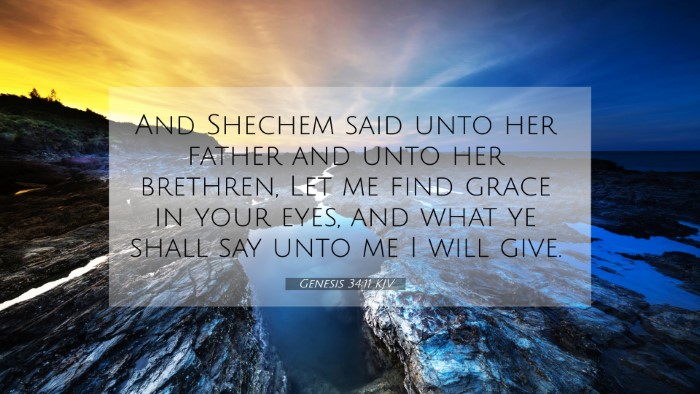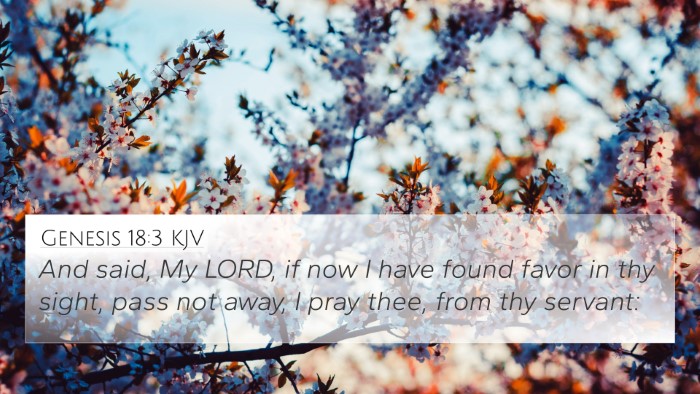Understanding Genesis 34:11
Genesis 34:11 states: "And Shechem said unto her father and unto her brethren, Let me find grace in your eyes, and what ye shall say unto me, I will give." This verse emerges from a narrative involving Shechem's desire for Dinah, Jacob's daughter, after a tragic event. The significance of this verse can be examined through various commentaries, revealing insights into the cultural and theological implications of Shechem's words.
Contextual Background
The events of Genesis 34 surround the account of Shechem, a Hivite prince, and his actions towards Dinah, prompting severe repercussions from her brothers. This chapter highlights themes of honor, justice, and cultural clashes between the Israelites and surrounding nations.
Insights from Public Domain Commentaries
Matthew Henry's Commentary
Matthew Henry observes the desperation in Shechem's request, noting that it illustrates the depth of his feelings towards Dinah. He suggests that Shechem's appeal for grace reveals the complexity of human emotions in the face of social norms and familial responsibilities. Henry emphasizes the idea that Shechem’s willingness to provide any dowry reflects an attempt to legitimize his actions and shows a misunderstanding of the gravity of his sin against Dinah and her family.
Albert Barnes' Commentary
Albert Barnes focuses on the implications of Shechem’s offer as an attempt to smooth over the wrong he inflicted. He discusses the cultural context, where a bride price was a way of establishing a marriage and making recompense. Barnes points out that Shechem’s offer is not merely a financial transaction but represents a desire for deeper connection and acceptance in a family and societal structure that was deeply impacted by honor and revenge.
Adam Clarke's Commentary
Adam Clarke provides a nuanced understanding of Shechem’s words by highlighting their persuasive nature. He notes that Shechem appeals to relational harmony—“let me find grace”—which implies he is aware of the severity of the situation. Clarke warns that such appeals can often mask underlying manipulative intentions, suggesting that the sincerity of an external appeal must be weighed against actions. His analysis encourages readers to consider the motivations behind requests for mercy.
Thematic Connections and Cross-References
Genesis 34:11 connects with several other biblical scriptures that illuminate themes of grace, justice, and familial honor. Some relevant Bible cross-references include:
- Genesis 34:3: "And his soul clave unto Dinah the daughter of Jacob, and he loved the damsel, and spake kindly unto the damsel."
- Exodus 22:16-17: This passage speaks to the laws regarding seduction and the responsibilities of a man towards a woman.
- Deuteronomy 22:28-29: Discusses the consequences for a man who violates a virgin, connecting with themes of social responsibility.
- 1 Timothy 1:15: Reflects on grace and redemption, similar to Shechem's desire for acceptance.
- Proverbs 21:21: Highlights the importance of pursuing righteousness, echoing the moral implications of the choices made in this narrative.
- Matthew 5:23-24: Discusses the importance of reconciliation, tying into Shechem’s appeal.
- Romans 3:23-24: Emphasizes humanity’s need for grace, a concept echoed in Shechem’s expression.
Conclusion
The narrative of Genesis 34:11 presents a multifaceted exploration of human relationships marked by desire, sin, and the quest for grace. The commentaries elucidate Shechem’s actions not only as a reflection of personal desire but also a touchstone for examining cultural ethics and the consequences of moral failings. Cross-referencing with other Biblical texts allows for a deeper understanding of its thematic relevance. Through this, readers can uncover the complexities of scriptural narratives and their interconnectedness in conveying overarching biblical principles of justice, grace, and redemption.
SEO Considerations
The connections drawn from Genesis 34:11 encourage further exploration of Bible verse cross-references and inter-Biblical dialogue. This verse serves as an excellent example for those learning about how to use Bible cross-references and finding thematic Bible verse connections. By examining scriptures that relate to each other, readers can journey into a deeper exploration of Bible verse parallels that enrich understanding and facilitate comprehensive Bible study. Utilizing tools such as a Bible concordance and cross-reference Bible studies enhances one’s ability to discern connections between texts, further illuminating Biblical themes and principles.




